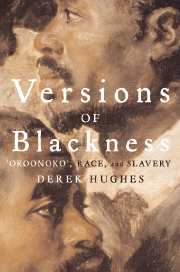Book contents
- Frontmatter
- Contents
- Introduction
- A Note on the Texts
- Chronology
- PART ONE THE MAJOR TEXTS
- PART TWO CONTEXTS: EUROPE, AMERICA, AND AFRICA
- A Short Account of the Destruction of the Indies
- Democrates Secundus
- “Of the Cannibals” and “Of Coaches”
- On Spreading the Gospel Among the Savages
- The English-American his Travail by Sea and Land
- A True and Exact History of the Island of Barbados
- The History of Sir Francis Drake
- Voyage de la France Equinoxiale en l'Isle de Cayenne
- An Exact Relation of the Most Execrable Attempts of John Allin
- The History of the Caribby-Islands
- Histoire Generale des Antilles Habitées par les François
- An Impartial Description of Surinam
- Great Newes from the Barbadoes
- The Negro's and Indians Advocate
- Friendly Advice to the Gentlemen Planters of the East and West Indies
- DISCUSSIONS OF COLONIALISM
- Bibliography
- Index
On Spreading the Gospel Among the Savages
Published online by Cambridge University Press: 05 June 2012
- Frontmatter
- Contents
- Introduction
- A Note on the Texts
- Chronology
- PART ONE THE MAJOR TEXTS
- PART TWO CONTEXTS: EUROPE, AMERICA, AND AFRICA
- A Short Account of the Destruction of the Indies
- Democrates Secundus
- “Of the Cannibals” and “Of Coaches”
- On Spreading the Gospel Among the Savages
- The English-American his Travail by Sea and Land
- A True and Exact History of the Island of Barbados
- The History of Sir Francis Drake
- Voyage de la France Equinoxiale en l'Isle de Cayenne
- An Exact Relation of the Most Execrable Attempts of John Allin
- The History of the Caribby-Islands
- Histoire Generale des Antilles Habitées par les François
- An Impartial Description of Surinam
- Great Newes from the Barbadoes
- The Negro's and Indians Advocate
- Friendly Advice to the Gentlemen Planters of the East and West Indies
- DISCUSSIONS OF COLONIALISM
- Bibliography
- Index
Summary
José de acosta (1539–1600) was a Jesuit who served as a missionary in Peru from 1571 to 1587. His Historia natural y moral de las Indias (1590) was an extremely influential description of the history, geography, and ethnography of the New World and was translated into English by Edward Grimstone in 1604. Like Las Casas, he opposed the oppression and over-taxation of the Native Americans and had several audiences with King Philip II, who favored his views over those of Sepúlveda.
That the incapacity of the Indians proceeds not from nature but from upbringing and custom
I shall add something that I think of the highest importance. In every respect, the Indians' slowness of mind and savagery are not caused by factors of birth, origin, or native climate but by their daily upbringing, and by habits not greatly dissimilar from the life of beasts. I have indeed been convinced of this for a long time, and am now unshakeably assured by hard facts. If one considers the matter soundly, upbringing generally plays a far larger part in human intelligence than birth. Ancestry and country admittedly have considerable force: corroborating the poet Epimenides, the Apostle Paul wrote, “The Cretians are alway liars, evil beasts, slow bellies” (Titus 1:12), as though nationality contributed much to perversity of customs. The observation of another poet, however, is also widely known: “You would think him a Boeotian, born where the air is dense” (Horace, Epistles 2.1.244).
- Type
- Chapter
- Information
- Versions of BlacknessKey Texts on Slavery from the Seventeenth Century, pp. 293 - 294Publisher: Cambridge University PressPrint publication year: 2007

